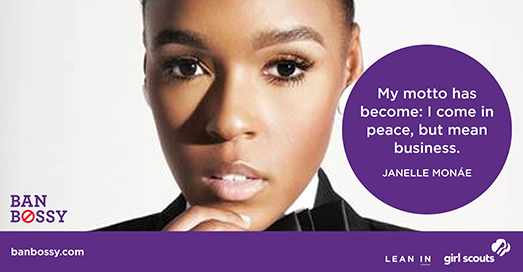Ban Bossy is a public service campaign
sponsored by Girl Scouts of America and Lean In, an organization which is the
namesake of the bestseller written by Sheryl Sandberg, Facebook’s current Chief
Operating Officer. If you haven’t read Lean
In, just do it.
Lean
In: Women, Work, and the Will to Lead is Sheryl
Sandberg’s response to the Facebook mantra “What would you do if you weren’t
afraid?” It is her reply to the concept “write the book you need to read.” It
is a thorough, well-researched work that explores the social constructs that
have led to a large deficiency of female leaders in our governments and
corporations.
Lean in is more than a book now. It is a
movement. It is about recognizing that women face discrimination and gender
biases in the workplace, but refusing to use these obstacles as excuses for our
failure to pursue leadership roles and successful careers. It’s about assuming success, getting it done,
then using positions of power to influence the way we as a society think about,
interact with, and raise our women.
Ban Bossy is the crucial next phase of the Lean In
movement. It is a call to change the way
educators, parents, and peers communicate with young girls. Women learn shame
and embarrassment as young girls. We learn that a demonstration of confidence
is quickly mistaken for arrogance. We learn that giving directions and asserting
ourselves makes us bossy and therefore not likeable. Simply put, Girls are
discouraged from leading.
Girls are twice as likely as boys to worry that leadership roles will make them seem “bossy.” - BanBossy.com
As a result, girls often lean towards passivity,
self-deprecation, and even passive-aggression in an effort to be well-liked. We
trade leadership for likability. As adults, we fail to sit at the table, and it
is assumed we don’t want to be invited. Our
talents, skills, and ideas never make it to said table. Everyone loses.
We hold ourselves back in ways both big and small, by lacking self-confidence, by not raising our hands, and by pulling back when we should be leaning in. We internalize the negative messages we get throughout our lives—the messages that say it’s wrong to be outspoken, aggressive, more powerful than men. - Lean In
So, what’s the solution? The answer is to
create environments where girls are encouraged and pushed to express their
opinions and assert themselves without being branded as aggressive or overly
ambitious (is there such a thing?). Women must pledge to model authentic,
assertive, and self-aware behavior for our children, and men must show them
that these attributes are not only acceptable, but desirable. We must abandon the sticks and stones
philosophy and own the power of our words. We must ban bossy, so that someday
there won’t be female leaders. There will just be leaders.
I encourage you to take the pledge at BanBossy.com, commit on social media
with #banbossy, and share your leadership story in the comments!


